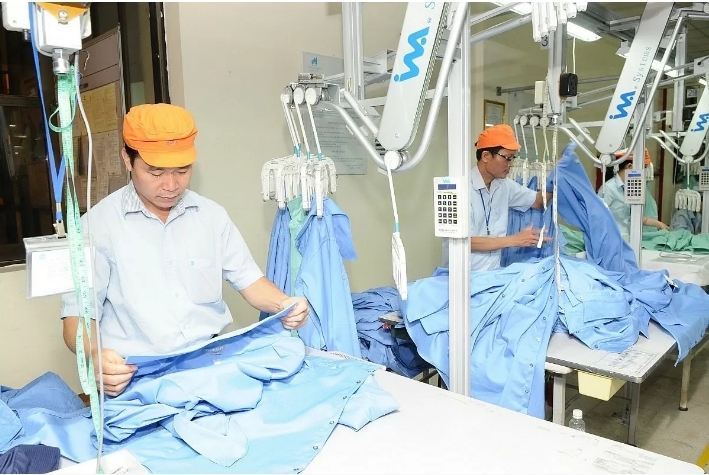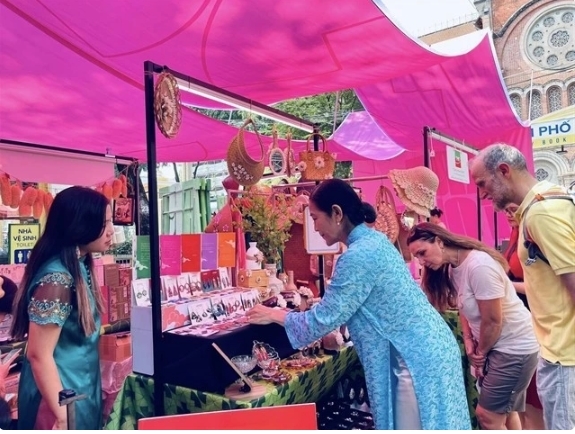Vietnamese goods exported to Northern Europe face challenges and have new opportunities
Tuesday, April 8,2025
AsemconnectVietnam - Reciprocal tariffs that the United States imposes on imported goods have brought both opportunities and challenges to Vietnamese goods exported to Northern European market.
Favorable exchange rate, Vietnamese goods prices can improve competitiveness
In a quick exchange with reporters of Industry and Trade Newspaper on morning of April 4, Ms. Nguyen Thi Hoang Thuy - Director, Head of Vietnam Trade Office in Sweden, concurrently in charge of Northern European market - said that on April 2, 2025, US President Donald Trump announced a series of large-scale reciprocal tariffs on imported goods from more than 100 countries. European Union (EU) is also subject to a 20% tax rate.
With this move, Ms. Nguyen Thi Hoang Thuy said that a notable positive factor is that the exchange rate is shifting in a direction that is favorable for Vietnamese goods. Specifically, USD depreciated while Swedish krona appreciated sharply, with exchange rate currently at 9.85 SEK/USD - the highest since June 2022. This means that Vietnamese goods priced in USD are becoming cheaper for Swedish consumers, helping to improve price competitiveness.
However, extent of this benefit depends on ability of Vietnamese enterprises to keep prices stable and not adjust the output USD price up. In addition, some industries still need to be cautious, such as textiles, footwear, seafood, wood products and handicrafts. Reason is that these are all industries with low profit margins and are easily affected by fluctuations in raw material costs, logistics and consumer demand. In particular, in context of rising inflation in the European and Northern European markets, consumers tend to tighten spending, making non-essential or low-value-added goods susceptible to reduced orders or price pressure.
Therefore, although exchange rate is creating favorable conditions, businesses still need to proactively control costs, stabilize selling prices and improve product quality and standards to maintain and expand market share in high-end markets such as Northern Europe.
Strong competition from Asian countries shifting to the EU
Along with the above advantages, Ms. Nguyen Thi Hoang Thuy said that in context of goods not being easily imported into the United States, China, Cambodia, Bangladesh and many other Asian countries will shift their exports to the EU and Northern Europe - markets that still maintain open trade and high consumer demand.
For example, China can increase its presence in the electronics, home appliances and mechanical industries in Europe. Bangladesh and Cambodia - major competitors in textile and garment industry, can boost flow of cheap goods into the EU. In particular, pressure comes not only from low prices, but also from delivery speed, flexible order fulfillment and strict standards of European market.
“Amidst the rising wave of trade barriers and protectionism, Vietnam - EU Free Trade Agreement (EVFTA) has become a strategic shield to help Vietnamese goods maintain their position in Europe,” Ms. Nguyen Thi Hoang Thuy affirmed. At the same time, she pointed out that industries that directly benefit include textiles, footwear; seafood, processed agricultural products; wooden furniture, handicrafts; electrical and electronic equipment.
Especially in Northern Europe - where consumers prioritize sustainable, green and transparent products - Vietnamese businesses can increase their advantages if they invest in certificates such as eco-label, traceability or carbon footprint verification.
Ms. Nguyen Thi Hoang Thuy added that although new US tax policy is a big challenge, it is also an opportunity for Vietnam to diversify its market, reducing its dependence on the US and short-term orders. In addition, transforming competitive model from low price to quality - sustainability - traceability. Invest in European standards such as eco-labels, carbon footprints, or CSR certifications to increase trust from Nordic consumers. In particular, optimize EVFTA - take advantage of tax incentives and position Vietnamese goods as "reliable alternatives" in the global supply chain.
"The US's reciprocal tax policy is creating a systemic change in global trade, which could create a wave of deep global recession and disruption. While major countries are still debating how to respond, Vietnamese businesses need to proactively adapt early" - Ms. Nguyen Thi Hoang Thuy pointed out.
Source: Vitic/ congthuong.vn
In a quick exchange with reporters of Industry and Trade Newspaper on morning of April 4, Ms. Nguyen Thi Hoang Thuy - Director, Head of Vietnam Trade Office in Sweden, concurrently in charge of Northern European market - said that on April 2, 2025, US President Donald Trump announced a series of large-scale reciprocal tariffs on imported goods from more than 100 countries. European Union (EU) is also subject to a 20% tax rate.
With this move, Ms. Nguyen Thi Hoang Thuy said that a notable positive factor is that the exchange rate is shifting in a direction that is favorable for Vietnamese goods. Specifically, USD depreciated while Swedish krona appreciated sharply, with exchange rate currently at 9.85 SEK/USD - the highest since June 2022. This means that Vietnamese goods priced in USD are becoming cheaper for Swedish consumers, helping to improve price competitiveness.
However, extent of this benefit depends on ability of Vietnamese enterprises to keep prices stable and not adjust the output USD price up. In addition, some industries still need to be cautious, such as textiles, footwear, seafood, wood products and handicrafts. Reason is that these are all industries with low profit margins and are easily affected by fluctuations in raw material costs, logistics and consumer demand. In particular, in context of rising inflation in the European and Northern European markets, consumers tend to tighten spending, making non-essential or low-value-added goods susceptible to reduced orders or price pressure.
Therefore, although exchange rate is creating favorable conditions, businesses still need to proactively control costs, stabilize selling prices and improve product quality and standards to maintain and expand market share in high-end markets such as Northern Europe.
Strong competition from Asian countries shifting to the EU
Along with the above advantages, Ms. Nguyen Thi Hoang Thuy said that in context of goods not being easily imported into the United States, China, Cambodia, Bangladesh and many other Asian countries will shift their exports to the EU and Northern Europe - markets that still maintain open trade and high consumer demand.
For example, China can increase its presence in the electronics, home appliances and mechanical industries in Europe. Bangladesh and Cambodia - major competitors in textile and garment industry, can boost flow of cheap goods into the EU. In particular, pressure comes not only from low prices, but also from delivery speed, flexible order fulfillment and strict standards of European market.
“Amidst the rising wave of trade barriers and protectionism, Vietnam - EU Free Trade Agreement (EVFTA) has become a strategic shield to help Vietnamese goods maintain their position in Europe,” Ms. Nguyen Thi Hoang Thuy affirmed. At the same time, she pointed out that industries that directly benefit include textiles, footwear; seafood, processed agricultural products; wooden furniture, handicrafts; electrical and electronic equipment.
Especially in Northern Europe - where consumers prioritize sustainable, green and transparent products - Vietnamese businesses can increase their advantages if they invest in certificates such as eco-label, traceability or carbon footprint verification.
Ms. Nguyen Thi Hoang Thuy added that although new US tax policy is a big challenge, it is also an opportunity for Vietnam to diversify its market, reducing its dependence on the US and short-term orders. In addition, transforming competitive model from low price to quality - sustainability - traceability. Invest in European standards such as eco-labels, carbon footprints, or CSR certifications to increase trust from Nordic consumers. In particular, optimize EVFTA - take advantage of tax incentives and position Vietnamese goods as "reliable alternatives" in the global supply chain.
"The US's reciprocal tax policy is creating a systemic change in global trade, which could create a wave of deep global recession and disruption. While major countries are still debating how to respond, Vietnamese businesses need to proactively adapt early" - Ms. Nguyen Thi Hoang Thuy pointed out.
Source: Vitic/ congthuong.vn
Vietnam's giant shrimp is sought after by rich Chinese, sold for 204 million USD in 2 months of 2025
List of items with preferential import tax reduction
Developing the seafood production chain
Vietnam aims for sustainable shrimp production to meet global demand
DAILY: Vietnamese coffee prices remained unchanged on Aupril 4, 2025
Vietnam’s PMI increased in March of 2025
New regulations on management of funds to support sustainable business enterprises issued
New regulations on fees for maintaining digital signature certificate verification system
Vietnamese coffee sets record export price
DAILY: Vietnamese pepper prices fell by 1000 VND on April 1, 2025
DAILY: Vietnamese coffee prices remained unchanged on April 1, 2025
Vietnam to take advantage of FTAs to reduce risks and increase export advantages
Exports of phones and components in first 2 months of 2025
Imports of goods from China increased by 20.7% in 2 months of 2025

Plan of Hai Duong province for a period of 2021 - 2030, ...
Organize space reasonably and harmoniously, focusing on connecting Hai Duong in common development space, actively contributing to the ...Plan of Hau Giang province in a period of 2021 - 2030, ...
Sustainable forestry development program in a period of ...

Art programme honouring Ao dai opens at HCM City Book ...
An art programme to honour and promote traditional cultural values and the beauty and grace of Ao dai has opened in Ho Chi Minh City. It ...From Hanoi to Brussels – a cross-cultural musical journey
Talented youngsters to enjoy int'l football ...
Tien Linh, Thuy Trang win Vietnam Golden Ball 2024
HCM City’s ao dai festival to feature mass folk dance with ...



